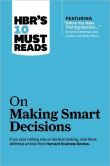 HBR’s 10 Must Reads on Making Smart Decisions
HBR’s 10 Must Reads on Making Smart Decisions
Various Contributors and Editors of Harvard Business Review
Harvard Business Press (2013
Learn why bad decisions happen to good managers — and how to make better ones
This is one in a series of volumes that anthologizes what the editors of the Harvard Business Review consider to be the “must reads” in a given business subject area, in this instance making smart decisions. I have no quarrel with any of their selections, each of which is eminently deserving of inclusion. Were all of these article purchased separately as reprints, the total cost would be at least $60 and the value of any one of them exceeds that. Given the fact that Amazon now sells this one for only $15.11, that’s quite a bargain. The same is true of volumes in other series such as “Harvard Business Review on….” and “Harvard Business Essentials.” I also think there is great benefit derived from the convenience of having a variety of perspectives and insights gathered in a single volume.
In all of the volumes in the “10 Must Read” series that I have read thus far, the authors and HBR editors make skillful use of several reader-friendly devices that include “Idea in Brief” and “Idea in Action” sections, checklists with and without bullet points, boxed mini-commentaries (some of which are “guest” contributions from other sources, and graphic charts and diagrams that consolidate especially valuable information. These and other devices facilitate, indeed accelerate frequent review later of key points later.
Here are three brief passages that are representative of the quality of the articles from which they are excerpted as well as the quality of the other seven articles in this volume.
From “Before You Make That Big Decision…,” Daniel Kahnerman, Dan Lovallo, and Olivier Sibony: “The real challenge for executives who want to implement decision quality control is not time or cost. It is the need to build awareness that even highly experienced, superbly competent, and well-intentioned managers are fallible. Organizations need to realize that a disciplined decision-making process, not individual genius, is the key to a sound strategy. And they will have to create a culture of open debate in which such processes can flourish.”
From “Conquering a Culture of Indecision,” Ram Charan: “The setting in which h dialogue occurs is as important as the dialogue itself. The social operating mechanisms of decisive corporate cultures feature behaviors marked by four characteristics: openness, candor, informality, and closure. Openness means that the outcome is not predetermined. There’s an honest search for options, alternatives, and new discoveries. Questions like `What are we missing?’ draw people in and signal the discussion leader’s willingness to hear all sides. Leaders create an atmosphere of safety that permits discussion, group learning, and trust.”
From “Make Better Decisions,” Thomas H. Davenport: “Focusing on decisions doesn’t necessarily require a strict focus on the mental processes of managers. (Though, admittedly, the black box deserves some unpacking.) It can mean examining the accessible components of decision-making – which decisions need to be made, what information is supplied, key roles in the process, and so forth. Smart organizations make multifaceted interventions – addressing technology, information, organizational structure, methods, and personnel. They can improve decision making in four steps.” Davenport discusses step in process, then observes: “An organization that has adopted these four steps should also assess the quality of decisions after the fact. The assessment should address not only actual business results – which can involve both politics and luck – but also the decision-making process and whatever information the manager(s) relied on”
If you read nothing else on how to make smart decisions, read these ten classic articles from Harvard Business Review.